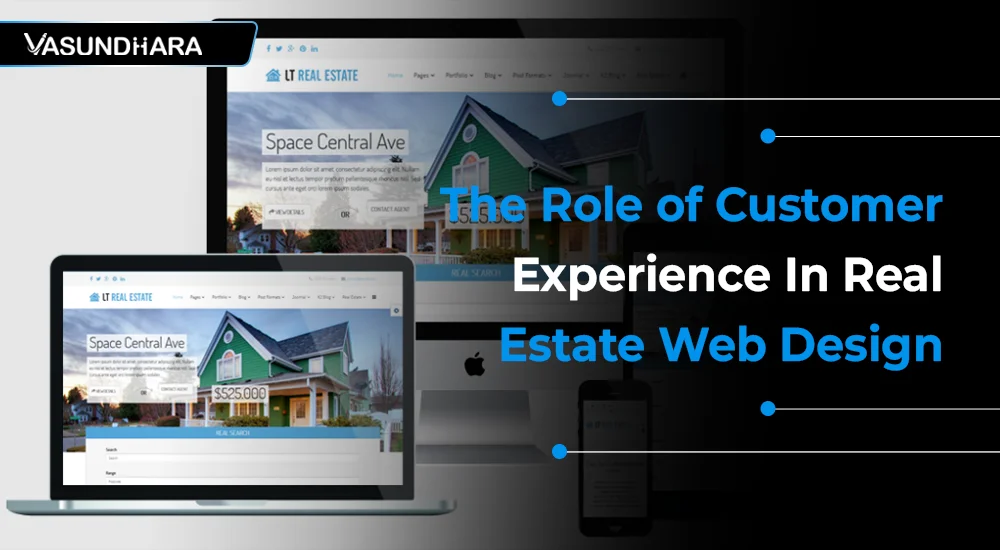In the age of digital transformation, the real estate sector has been steadily inching its way into the online sphere.
Having a robust digital footprint isn’t just a modern luxury; it’s a necessity. What determines the potency of this online presence? The answer lies in web design and more importantly, user experience (UX) and customer experience in real estate.
Ever visited a property and felt an instant connection? That's the magic of a first impression. Your website needs to offer the same experience.
Customer experience (CX) encompasses every interaction a customer has with a brand, from the first visit to a website to post-purchase support. In the realm of real estate web design, CX is not only about aesthetics but also about functionality, usability, and emotional resonance.
Let's delve deeper into why prioritizing customer experience is essential for success in the competitive world of real estate.
What is User Experience (UX)?
At its core, User Experience is about how a user feels when interacting with a digital product.
A perfect UX design is a blend of aesthetics, functionality, and emotions. Think about it: a property might have all the amenities, but if it lacks the right aura, will it attract buyers? Similarly, a website might have all the information, but if it isn’t user-friendly, will visitors stay?
UX design aims to understand user needs and behaviors, creating products that fulfill those needs efficiently and delightfully. By prioritizing UX, organizations can enhance user satisfaction, loyalty, and engagement, ultimately leading to greater success in the market.
Why UX Matters in Real Estate Web Development?
UX matters in real estate web development because it directly impacts how potential buyers and sellers interact with real estate websites and platforms. In an industry where visual appeal, ease of use, and access to information are crucial, a positive user experience can differentiate one real estate service from another.
Intuitive navigation, high-quality imagery, mobile optimization, personalized recommendations, and seamless communication channels all contribute to a better user experience. By prioritizing UX, real estate professionals can attract and retain clients, streamline the property search process, and ultimately drive more successful transactions.
Additionally, positive user experiences can lead to word-of-mouth referrals and enhanced brand reputation in the competitive real estate market. Here are reasons why UX is crucial in the real estate sector:
- First Impressions Are Digital Now:
Over 90% of home buyers start their search online. highlighting the importance of customer experience in real estate. A clunky website will push them to your competitors.
- Build Trust Before The First Visit:
A fluid, easy-to-navigate website assures users of your professionalism, establishing trust.
Exceptional UX could be the difference between a user simply browsing and making an inquiry or booking a viewing.
Have you ever left a website because it was too confusing or took too long to load? That’s the impact of UX.
Also read: Vital Steps To Building Your Dream Real Estate Website From Scratch
Key UX Components for Real Estate Websites
Creating a user-friendly and effective real estate website requires careful attention to user experience (UX) design. Here are Some key UX components for real estate websites.

A cluttered space, whether physical or digital, repels visitors. Your website should offer clear navigation paths. Imagine walking into an open house and knowing exactly where everything is. That's the clarity your website needs.
- High-Quality Property Images and Videos
A picture speaks a thousand words. Invest in professional photography to make properties stand out. Better yet, integrate 360-degree virtual tours. Allow your visitors to 'walk' through properties from the comfort of their homes.
Did you know? Nearly 60% of searches now come from mobile devices. A site that doesn't adapt to various screen sizes risks losing a significant chunk of potential clientele.
- Efficient Search and Filter Options
Time is valuable. Ensure users can swiftly find what they're after with intuitive search and filter features, which are essential features of a real estate website.
- Clear Calls to Action (CTAs)
Each page should guide users to the next step. Whether it's 'Schedule a Viewing', 'Contact Us', or 'Learn More', make it clear, enticing, and straightforward.
Also read: Top 10 Benefits of Having a Real Estate Website
Common Mistakes in Real Estate Web Design and How to Avoid Them
The online realm of real estate is cluttered, and standing out often hinges on avoiding pitfalls.
Recognizing and rectifying these errors can be the distinguishing factor between a thriving online presence and one that gets lost in the digital shuffle.
- Overloading with Information
Information is valuable, but too much can drown out the essentials.
Users can feel overwhelmed if they're bombarded with excessive text or images.
Solution
Use a minimalistic approach. Prioritize information, employing a mix of visuals and text.
Incorporate collapsible sections for detailed info, ensuring the primary content remains uncluttered.
In the age where smartphones dominate, not optimizing for mobile can drastically reduce your site's potential reach.
Solution
Adopt a mobile-first design strategy. Ensure your site is responsive, with touch-friendly buttons, easy navigation, and quick load times on mobile devices.
Slow website speed can test a visitor's patience. Statistics reveal that a mere 2-second delay in webpage load time can increase bounce rates by up to 50%.
Solution
Regularly optimize images, leverage browser caching, and consider using a Content Delivery Network (CDN). Tools like Google PageSpeed Insights or GTmetrix can provide insights and recommendations.
Apotential lead can be lost with every unnecessary field in a contact form.
If users find the form tedious, they might abandon it altogether.
Solution
Limit your contact forms to essential fields only—typically name, email, phone number, and a message box. A shorter form can significantly boost submission rates.
While using stock images might seem like a cost-effective solution, they often lack authenticity.
Generic photos can make your website feel less genuine and fail to resonate with users.
Solution
Invest in professional property photography. Real photos give a true feel of the property and build trust with potential clients. Moreover, localized or custom images convey a personal touch.
Testimonials, reviews, and success stories can significantly influence a potential client's decision. Ignoring these can mean missing out on a trust-building opportunity.
Solution
Include a dedicated section showcasing client testimonials, ratings, or case studies.
This not only adds credibility but also provides a real-world perspective on your service quality.
- Not Highlighting Unique Selling Points (USPs)
Every real estate agency or agent has something unique to offer. Failing to highlight these aspects can lead to missed opportunities.
Solution
Identify what sets you apart—be it your local market expertise, your tech-savvy approach, or your exceptional after-sales service—and make sure it's prominently displayed on your website.
Develop Real Estate Websites with Exceptional UX With Vasundhara Infotech
At Vasundhara Infotech, we take immense pride in crafting exquisite real estate web designs that seamlessly blend cutting-edge technology with stunning design.
With a keen eye for detail and a passion for design and innovation, we are dedicated to helping real estate professionals stand out in a competitive market through our top-notch web development solutions.
Explore our web design portfolio to see how we've transformed real estate businesses into digital success stories.
Tips for Hiring a Web Designer with a Strong Grasp on UX
Selecting the right web designer for your real estate website is pivotal. Here's how to ensure you bring on someone who understands the nuances of User Experience:
- Prioritize Experience Over Aesthetics
While a portfolio filled with beautiful websites is appealing, delve deeper.
Ask the designer about the reasoning behind certain design choices. This can give you insight into their UX thinking.
A great way to understand the effectiveness of a designer's work is through case studies.
These provide a tangible measure of how design decisions improved user engagement or increased conversions for previous clients.
The best UX designs often come from collaboration. Make sure your designer is open to feedback, willing to iterate, and values your insight as a real estate expert.
A designer with a robust UX foundation will often begin with user research, create user personas, and then move into wireframing and prototyping before finalizing the design.
This structured approach ensures that the user remains at the center of the design process.
- Stay Updated with UX Trends
UX is a continually evolving field. Ask potential designers how they stay updated with the latest UX trends and best practices.
Their commitment to continuous learning can be a strong indicator of their dedication to the craft.
- Testimonials and References
Beyond just reading testimonials, consider reaching out to past clients. Ask them about their experience working with the designer, the challenges faced, and how the designer addressed them.
Budget Considerations: Remember, a higher price tag doesn’t always mean better UX. Seek out designers who can offer a balance of cost-effectiveness and quality.
Ensure that your designer understands the technicalities of web design, especially as it pertains to real estate.
Features like property databases, IDX integration, and mortgage calculators can be essential for your site.
Communication, empathy, and problem-solving are invaluable. A designer with strong soft skills will be better equipped to understand user needs and translate them into a functional design.
Finding the right designer to develop the best real estate web design can be daunting. Need guidance? A web design company In Surat, Vasundhara Infotech is at your help. Reach out to us, and we'll connect you with the industry's best.
Conclusion
A property might captivate with its design and location, but its online representation, infused with a superior customer experience in real estate, determines its reach.
UX isn't just a buzzword; it's the foundation of successful digital real estate. So, ensure your digital 'property' is as appealing and user-friendly as the physical ones you're selling.
Facing challenges with your real estate website? Want to optimize its UX? Send us an inquiry, and we'll turn those digital challenges into conversions.




